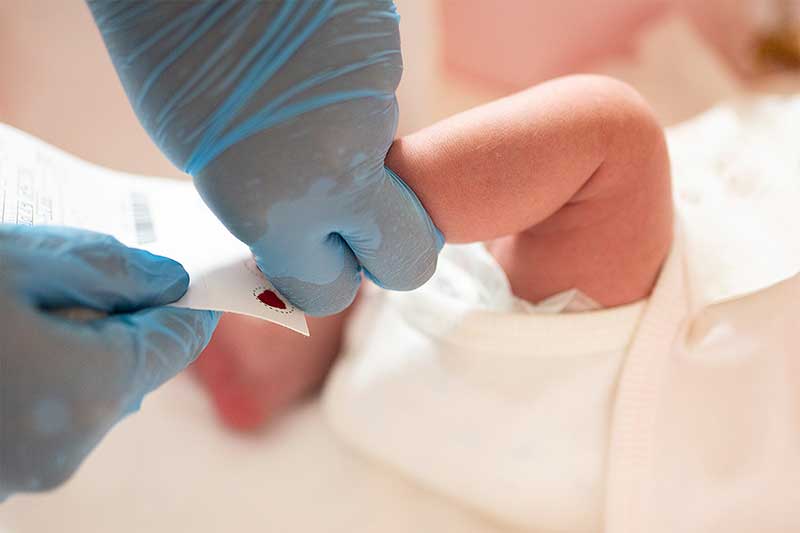
Exposure to iodine used for medical procedures in a neonatal intensive care unit (NICU) may increase an infant’s risk for congenital hypothyroidism (loss of thyroid function), suggests a study by researchers at the National Institutes of Health and other institutions. The authors found that infants diagnosed with congenital hypothyroidism following a NICU stay had higher blood iodine levels on average than infants who had a NICU stay but had normal thyroid function. Their study appears in The Journal of Nutrition.
“Limiting iodine exposure among this group of infants whenever possible may help lower the risk of losing thyroid function,” said the study’s first author, James L. Mills, M.D., of the Epidemiology Branch at NIH’s Eunice Kennedy Shriver National Institute of Child Health and Human Development (NICHD).
Congenital hypothyroidism is a partial or complete loss of thyroid function. The thyroid, located in the throat, makes iodine-containing hormones that regulate growth, brain development and the rate of chemical reactions in the body. Treatment consists of thyroid hormone therapy and must begin within four weeks after birth or permanent intellectual disability may result.
In the United States, all infants are routinely screened for the condition by collecting a small sample of blood from an infant’s heel and analyzing it for thyroid stimulating hormone. Infants with a high level of thyroid stimulating hormone are referred for further testing.
To conduct the study, the researchers analyzed blood spots for their iodine content. They compared blood iodine levels from 907 children diagnosed with congenital hypothyroidism to those of 909 similar children who did not have the condition. This included 183 infants cared for in the NICU—114 of whom had congenital hypothyroidism and 69 who did not.
Overall, the researchers found no significant difference between blood iodine concentrations in those who had congenital hypothyroidism and those in the control group. Because very high or very low iodine levels increase the risk for congenital hypothyroidism, they also looked at those infants having the highest and lowest iodine levels.
Children with congenital hypothyroidism were more likely to have been admitted to a NICU than those without congenital hypothyroidism. When the researchers considered only those infants with a NICU stay, they found that the group with congenital hypothyroidism had significantly higher iodine levels than those without the condition who also had a NICU stay. Similarly, those with congenital hypothyroidism and a NICU stay tended to have higher blood iodine than children with the condition who did not have a NICU stay.
The researchers were unable to obtain information on the medical procedures the infants may have undergone during their time in the NICU. Iodine solutions are commonly used as disinfectants to prepare the skin for surgical or other procedures. Preterm infants absorb iodine more readily through their skin than older infants. Iodine also is given internally for imaging procedures used in infants.
The researchers said that the higher iodine levels seen among infants with congenital hypothyroidism and a NICU stay may have resulted from exposure to iodine during a medical procedure. Because of this possibility, they cautioned NICU staff to use disinfectants that do not contain iodine whenever possible and to avoid exposing infants to iodine unless absolutely necessary.
###
About the Eunice Kennedy Shriver National Institute of Child Health and Human Development (NICHD): NICHD leads research and training to understand human development, improve reproductive health, enhance the lives of children and adolescents, and optimize abilities for all. For more information, visit https://www.nichd.nih.gov.
About the National Institutes of Health (NIH): NIH, the nation’s medical research agency, includes 27 Institutes and Centers and is a component of the U.S. Department of Health and Human Services. NIH is the primary federal agency conducting and supporting basic, clinical, and translational medical research, and is investigating the causes, treatments, and cures for both common and rare diseases. For more information about NIH and its programs, visit https://www.nih.gov.

 BACK TO TOP
BACK TO TOP